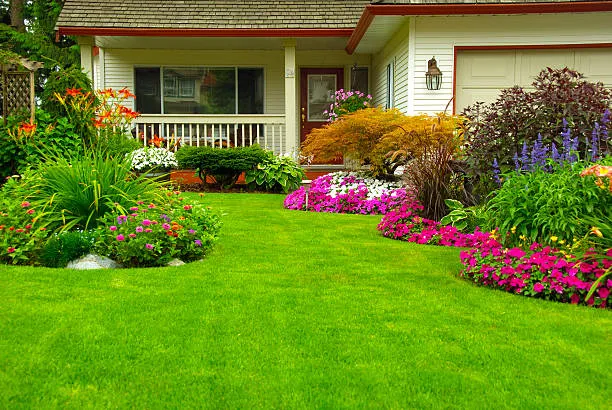1 / Focus on the Foliage
A tropical garden design style is all about the density of planting. Tropical plants are mostly about the leaves rather than the flowers; many have glossy, and often quite large, leaves with patterns on them, or foliage that has distinctly different colours on the top and underside.
In a tropical landscape, the aim is to create a closely planted garden where plants appear to jostle for space. Plants should be chosen based on their height, size, shape and texture of their leaves.
First, tall canopy plants create an upper canopy, giving shade and shelter to the lower growing plants beneath.
Next come the focal WOW plants to create interest at ground level.
These are then surrounded by ‘fillers’ – which are medium-sized leafy bushes and shrubs that fill in the remaining spaces, before the final ground covers.
Our favourite go-to tropical plants for Auckland gardens:
Canopy plants
Native tree ferns
Musa (banana palms)
Clumping bamboos
Bangalow Palms
Nikau palms
WOW / Focal plants
Bromeliad Alcantara Rubra
Cycad revoluta
Vriesea Hieroglyphica
Bird of Paradise
Tall & Medium Fillers
Cordyline
Gingers
Hibiscus
Murraya
Canna lilies
Frangipani
Gardenia
Dwarf bamboo – fairy
Griselinia lucida
Tractor Seat
Philodendron xanadu
Groundcovers
Clivia
Bromeliads
Liriope
Mondo grass
Native ferns
Spanish shawl
Climbers & creepers
Bougainvillea
Tecomanthe speciosa
Mexican flame vine
Star jasmine

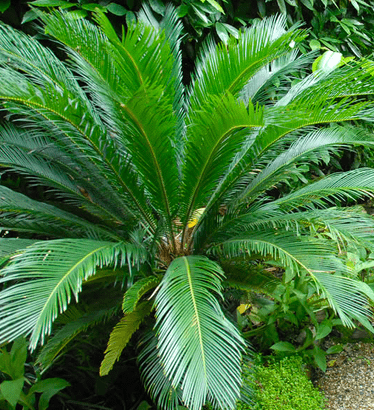
2 / Plant In Numbers & Shapes
Garden designers regularly plant in odd number groupings (three, five, seven and nine). This ensures that the same colours and textures can be seen throughout the garden, bringing a cohesion of colour and texture to the entire space.

3 / Plant Placement
When laying out your garden bed, start by placing the largest structural plants first & work your way down to the smallest. Stand back and look at the garden from various angles & views from your home and adjust the plant’s positioning so that it looks good from every angle. Once you’re happy with how the grouping looks, you’re ready to plant! Plant largest to smallest too.
Add a touch more drama and interest by placing plants with contrasting leaf shape, colour and size together; planting in triangle formations or zigzags throughout the garden also helps with the overall composition.
Finally, make sure you know how large a plant is going to grow when you lay it out. Although a plant might look small in its pot, in a few years time it may have quadrupled in size and crowded out its neighbour!
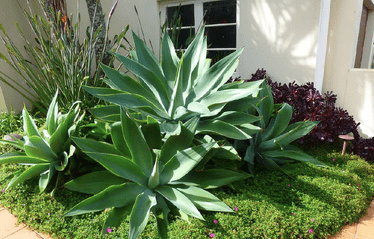

4 / Add A Water Feature
The abundance of large leafed plants implies a wealth of water. This is a crucial note in a tropical garden design. Even more so, the sight, sound and smell of flowing water is an important feature when we think ‘tropical’! Size really doesn’t matter here – if at all possible, add an element of water to your garden.

5 / Colour Crazy
It’s free reign! Tropical gardens give you full creative control to use all of the bright, vivid colours your heart desires – go for pinks, reds, yellows & oranges.
Hibiscus, Canna lilies & Bromeliads are our favourites for bringing those bright pops of colour,
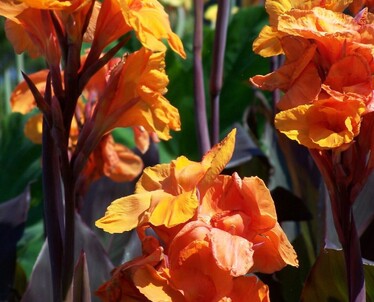

6 / Regular maintenance
This type of garden needs regular maintenance! Our Sculpt Garden’sfounder and Garden Designer, Claire, recommends keeping an eye out for these common issues:
- Cut back canna’s to ground height when they’ve finished flowering
- Dispose of large palm fronds
- Trim decaying leaves
- Most importantly keeping everything trimmed to shape so that the gorgeous lushness doesn’t grow into chaos!!
“Tropical plants with big leaves use lots of nutrients so you need to feed the soil regularly to keep your tropical garden looking healthy & lush. We use sheep pellets all the time.”

7 / Outdoor Lighting
Outdoor lighting will greatly improve the look & feel of your tropical garden when night-time comes. Light up those feature plants! Try spotlights, candles & tealights or even down lights.
Bamboo torches are also a unique way of adding a tropical vibe to your luscious garden. They’re relatively cheap and readily available and a lovely choice to brighten up otherwise unlit areas of your garden for special events like birthday parties.
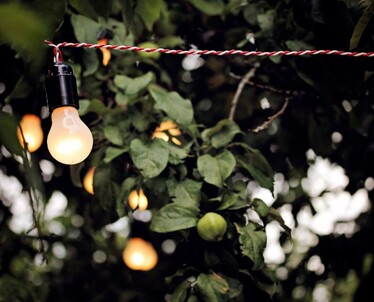

8 / Irrigation
You can’t get past the fact that tropical gardens, by design, will require more water than less demanding planting (like native gardens). You might want to invest in a timed irrigation system or run dripping hoses through the tropical garden beds, which will keep them well watered in the summer months. To keep moisture locked into the soil, ensure the garden beds are generously mulched – this will help suppress weeds too.
Feeling inspired? Start planning your tropical oasis now.

